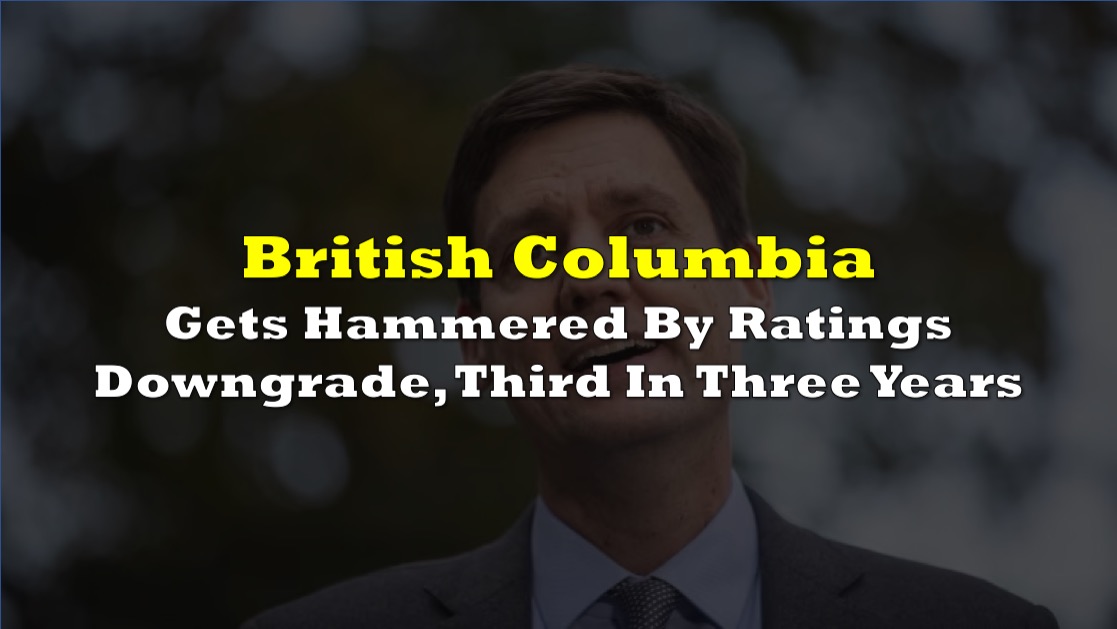British Columbia faces its third credit rating downgrade in three years as S&P Global Ratings recently lowered its rating to AA- with a negative outlook. This action follows the provincial government’s decision to escalate borrowing.
S&P Global warned of a potential further downgrade within the next two years if British Columbia persists in its current fiscal trajectory. The province, ranked as Canada’s third-largest by population, is under scrutiny for its financial path.
British Columbia's credit rating outlook took two hits over 24 hours.
— Kirk Lubimov (@KirkLubimov) April 9, 2024
S&P Global downgrades BC for the third time in three years, from AA to AA-.
Moody's also changes outlook for the province to negative but affirms AAA rating, for now.
Sluggish economy with continuous…
“With the continued impact of macroeconomic headwinds on the cost of living, B.C. has maintained focus on taxpayer affordability. At the same time, with robust population growth, the province is investing in infrastructure at unprecedented levels. While other provinces are contending with similar issues in their recent budget announcements, the size and persistence of material after-capital deficits differentiate B.C. from its peers,” S&P Global explained in its note.
The recent projection by the BC government forecasts a record deficit nearing $8 billion for the 2024-25 fiscal year. This projection accompanies plans to accelerate spending on critical sectors such as infrastructure, healthcare, and education, notably before an upcoming provincial election scheduled for October 19.

In response to the downgrade, S&P expressed concerns about the anticipated deterioration in BC’s fiscal performance. Operating deficits exceeding 5% of operating revenue and after-capital deficits hovering around 20% of total revenue suggest a challenging budgetary outlook compared to domestic and international peers.
Moody’s Investors Service, which had previously rated BC at its highest grade of Aaa since 2006, meanwhile adjusted its outlook to negative. The agency cited the province’s tolerance for ongoing deficits and mounting debt levels as indicators of weakened governance risk controls and financial management.
“The negative outlook for British Columbia reflects the risks to the province’s ability to slow a significant projected increase in debt amid rising spending commitments and its lack of commitment to return to fiscal balance within a specified time period,” the agency said.
NEW – BC has suffered its second credit rating downgrade in a single day.
— Rob Shaw (@RobShaw_BC) April 9, 2024
Moody's has announced it has changed its outlook on BC from "stable" to "negative."
Despite the downgrade, Finance Minister Katrine Conroy emphasized BC’s economic resilience, citing its low unemployment rate and a debt-to-GDP ratio among the lowest of Canadian provinces. She reiterated BC’s standing as a leader in economic growth and job creation.
However, the opposition BC United Party, formerly known as the BC Liberal Party, attributed the downgrade to what they labeled as “reckless spending” by Premier David Eby’s New Democratic Party-led government.
“Each downgrade under the NDP brings higher taxes and tighter budgets for British Columbians. The result is higher costs for loans, as David Eby’s policies drain our wallets,” BC United Shadow Minister for Finance Peter Milobar said.
British Columbia’s credit rating downgrade marks a significant shift from its previous AAA rating by S&P until July 2021. Nevertheless, its current AA- rating remains among the top rankings provided by the agency, comparing favorably with other major Canadian provinces.
Information for this briefing was found via Bloomberg and the sources mentioned. The author has no securities or affiliations related to this organization. Not a recommendation to buy or sell. Always do additional research and consult a professional before purchasing a security. The author holds no licenses.









